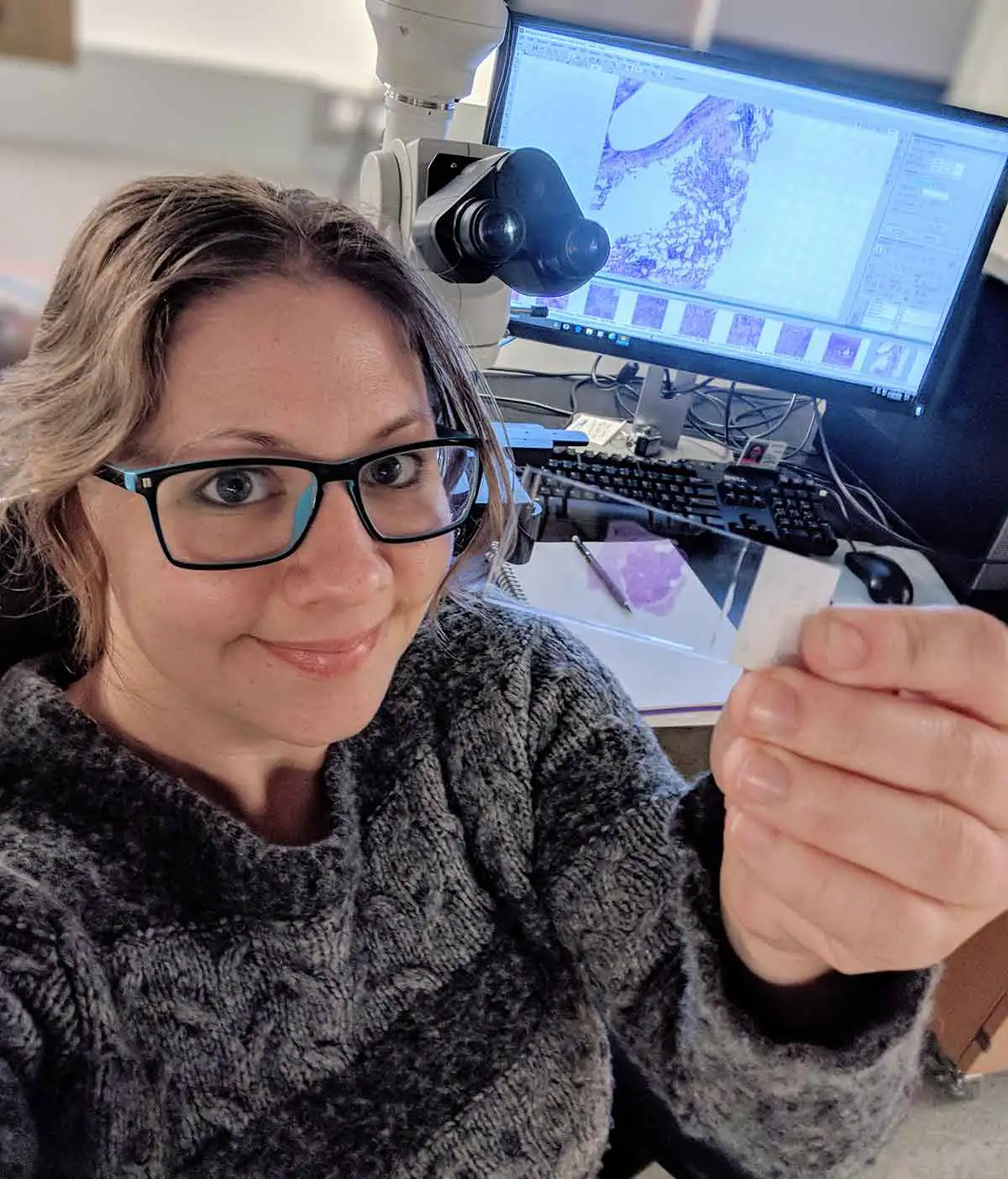USDA ARS participant conducts bovine tuberculosis research
Meet Carly Kanipe
Carly Kanipe, a doctoral immunobiology student at Iowa State, has always known that she would pursue a career in STEM. Growing up, her family constantly and enthusiastically encouraged her scientific interests and supported her curiosity in the natural world.
Doctoral student Carly Kanipe holding a section of lung from a steer with bovine tuberculosis. Photo Credit: Carly Kanipe
“Ultimately, it was never a question of if I would choose a STEM career,” said Kanipe, “but rather, which STEM career I would choose.”
Kanipe explored many different STEM fields, but felt particularly drawn to disease research. As an undergraduate at the University of Iowa, Kanipe pursued this interest by studying cell and developmental biology. But after receiving her bachelor’s degree in 2008, Kanipe was still unsure of what she wanted to do. It wasn’t until she was exposed to animal research that Kanipe found a new calling—microbiology and pathology of animal and zoonotic diseases.
Kanipe went on to receive her DVM degree from the Iowa State College of Veterinary Medicine in 2016, beginning her doctoral program immediately after. Through the U.S. Department of Agriculture’s (USDA) Agricultural Research Services (ARS) Research Participation Program, Kanipe gained valuable hands-on experience conducting quality animal research.
The USDA ARS Research Participation Program provides opportunities for students, postgraduates, established scientists and faculty to participate in programs, projects and activities at ARS-designated facilities to help ARS solve agricultural problems of high national priority. For her fellowship, Kanipe was stationed at the USDA ARS National Animal Disease Center (NADC) located in Ames, Iowa.
Under the guidance of her mentor, Mitchell Palmer, DVM, Ph.D., Kanipe spent three years studying the immunopathogenesis of bovine tuberculosis. In a study of 49 cattle, all of which were challenged with virulent bacteria, Kanipe tested and evaluated the efficacy of a bacterially-vectored subunit vaccine to protect against bovine tuberculosis, both independently and in conjunction with a human vaccine, Bacillus Calmette-Guérin (BCG). Due to the zoonotic risk posed by the bovine tuberculosis, her research was conducted in special biosafety facilities. There, Kanipe evaluated cytokine production from peripheral blood, grossly and histologically scored lung and lymph node pathology and quantitatively cultured tissues to determine the effects of the novel vaccine on the bovine immune system.
Without this program, I absolutely would not have been able to attain the position that I have. It has helped me not only become a quality scientist but also network with scientists who can provide continued mentorship as needed.
Other projects Kanipe contributed to include the description of a novel tuberculous-causing bacteria in banded mongooses, the evaluation of BCG in white-tailed deer infected with closely related environmental bacteria, evaluation of current and novel proteins and protein-cocktails for use in diagnostic skin testing and evaluation of water and saliva samples for use describing bacterial shedding. All of these efforts are important to understanding and combatting bovine tuberculosis.
“The ultimate goal of our research is to provide a feasible road map to eradicating bovine tuberculosis in the United States,” explained Kanipe. “A protective vaccine, sensitive and specific diagnostics and understanding bacterial shedding dynamics are all crucial for this goal. Additionally, our research could be used to help other countries where bovine tuberculosis is more common.”
During her fellowship, Kanipe developed many new skills and had the opportunity to publish her research in many prominent veterinary journals, including Veterinary Immunology, Veterinary Pathology and Veterinary Microbiology. She recommends the program to others and emphasized the sense of fulfillment she received from her experience.
“Unlike academia, governmental research is required to have applicability,” said Kanipe. “The thought that my research could potentially lead to a new vaccine or help eradicate a disease was very motivating for me.”
Kanipe recently joined NADC as a Research Veterinary Medical Officer and credits her fellowship with helping her achieve her career goals.
“Without this program, I absolutely would not have been able to attain the position that I have,” Kanipe said. “It has helped me not only become a quality scientist but also network with scientists who can provide continued mentorship as needed.”
Kanipe is excited to continue her research on bovine tuberculosis and to work alongside the talented scientists at NADC.
“I feel so fortunate to have excellent coworkers, animal care staff and technicians,” said Kanipe. “I hope that together, we can make a positive impact on animals and people affected with this disease.”
The USDA ARS Research Participation Program is funded by USDA and is administered through the U.S. Department of Energy’s (DOE) Oak Ridge Institute for Science and Education (ORISE). ORISE is managed for DOE by ORAU.

